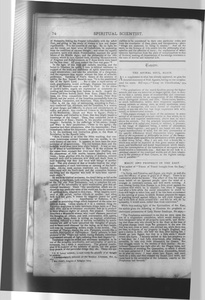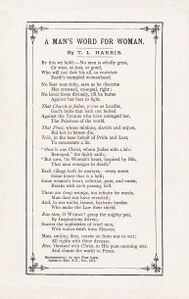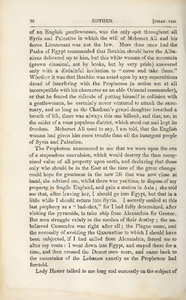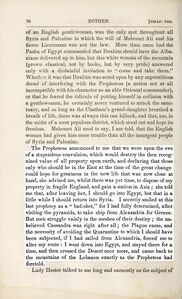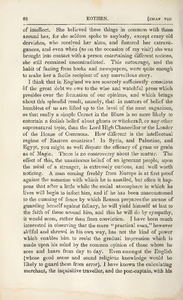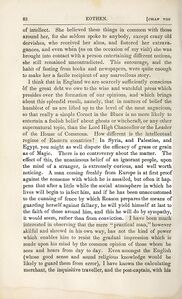HPB-SB-3-69: Difference between revisions
(+text) |
mNo edit summary |
||
| (11 intermediate revisions by 2 users not shown) | |||
| Line 13: | Line 13: | ||
| status = ok | | status = ok | ||
| continues = | | continues = | ||
| author = | | author = Kinglake, Alexander William | ||
| title = Magic and Prophecy in the East | | title = Magic and Prophecy in the East | ||
| subtitle = | | subtitle = | ||
| untitled = | | untitled = | ||
| source title = | | source title = Spiritual Scientist | ||
| source details = | | source details = v. 1, No. 7, October 22, 1874, p. 74 | ||
| publication date = | | publication date = | ||
| original date = | | original date = | ||
| Line 25: | Line 25: | ||
}} | }} | ||
{{Style S-Small capitals|The}} author of | {{Style S-Small capitals|The}} author of “Traces of Travel brought from the East” says,— | ||
{{Style P-Quote|“In Syria, and Palestine, and Egypt, you might as well dispute the efficacy of grass or grain as of Magic. There is no controversy about the matter. The effect of this, the unanimous belief of an ignorant people, upon the mind of a stranger is extremely curious, and well worth noticing. A man coming freshly from Europe is, at first, proof against the nonsense with which he is assailed ; but often it happens that after a little while the social atmosphere in which he lives will begin to infect him, and if he has been accustomed to the cunning of sense, by which Reason prepares the means of guarding herself against fallacy, he will yield himself at last to the faith of those around him : and this he will do by sympathy, it would seem, rather than from conviction.”}} | {{Style P-Quote|“In Syria, and Palestine, and Egypt, you might as well dispute the efficacy of grass or grain as of Magic. There is no controversy about the matter. The effect of this, the unanimous belief of an ignorant people, upon the mind of a stranger is extremely curious, and well worth noticing. A man coming freshly from Europe is, at first, proof against the nonsense with which he is assailed ; but often it happens that after a little while the social atmosphere in which he lives will begin to infect him, and if he has been accustomed to the cunning of sense, by which Reason prepares the means of guarding herself against fallacy, he will yield himself at last to the faith of those around him : and this he will do by sympathy, it would seem, rather than from conviction.”}} | ||
While thus making light of the Spiritualism of the East the author gives the following to illustrate the prophetic or clairvoyant pretensions of Lady Hester Stanhope. He says,— | While thus making light of the Spiritualism of the East the author gives the following to illustrate the prophetic or clairvoyant pretensions of Lady Hester Stanhope. He says,— | ||
| Line 60: | Line 60: | ||
{{Style P-HPB SB. Article separator}} | {{Style P-HPB SB. Article separator}} | ||
{{Style S-Small capitals|In}} “The Revue Phil | {{Style S-Small capitals|In}} “The Revue Phil. et Relig.,” of May, 1856, A. A. Mountersely said : “ When a table moving under the hands of four persons, myself included, in answer to a question of mine, announces to me ''beforehand'' the exact number of words and letters that the answer, often a long one, will contain, and without a mistake as to either, is it my reason that does this ? If so, let an academician try it. | ||
“ When it spells out an answer in numerous verses, beginning with the last letter of the last word of the last verse, and continuing thus backwards to the first letter of the strophe, is it my reason that does this? If so, let an academician try it. | “ When it spells out an answer in numerous verses, beginning with the last letter of the last word of the last verse, and continuing thus backwards to the first letter of the strophe, is it my reason that does this? If so, let an academician try it. | ||
| Line 74: | Line 74: | ||
| status = ok | | status = ok | ||
| continues = | | continues = | ||
| author = Child, T | | author = Child, H. T. | ||
| title = The Katie King Materializations | | title = The Katie King Materializations | ||
| subtitle = | | subtitle = | ||
| Line 86: | Line 86: | ||
}} | }} | ||
<sup>{{Style S-HPB SB. Editors note| | <sup>{{Style S-HPB SB. Editors note|⊕}}</sup> The mediumship of Mr. and Mrs. Holmes of Philadelphia would perhaps never be heard of in some quarters, were it not that the papers and people in that benighted section readily give currency to the fact, by denouncing it as a deception. A correspondent, “ Occasional,” presents a reasonable inquiry on page 89. In this connection we would say”, without mentioning any particular case, that we believe Mr. Holmes to have that power, as a physical medium, through which advanced spirits can and do materialize. Mr. Holmes is taller, has longer fingers, and is every way dissimilar in ''personnel'' to the womanly figure which appears as Katie King. Another and the best proof that this figure is a materialization is found in the fact that after a few seconds it will dematerialize,—this dissolving process commencing usually at the eyes. On a close inspection it will be found that their brightness deadens, the whites become elongated, and seem to almost drop from their sockets like tears. This dematerialization occurred once in London ; the medium, Miss Cook, was in the cabinet, Katie King being grasped and held firmly by an individual who thought he had the medium, the figure dematerialized in his arms—actually dissolved into nothingness. Henry Wilson being quoted as authority that the Holmes were imposters, we wrote to Dr. Child, and the following letter explains itself:— | ||
{{Style P-Align right|{{Style S-Small capitals|Philadelphia}}, Oct. 25, 1874.}} | {{Style P-Align right|{{Style S-Small capitals|Philadelphia}}, Oct. 25, 1874.}} | ||
| Line 99: | Line 99: | ||
Wishing you success in your paper, I am truly yours, | Wishing you success in your paper, I am truly yours, | ||
{{Style P-Signature in capitals|Henry Т. Child, M.D.{{Style S-HPB SB. HPB note|??}}}} | |||
{{Footnotes start}} | {{Footnotes start}} | ||
{{Style S-HPB SB. HPB note|⊕ A paragraph from a paper red by D.G. Wyld upon the spirit powers of man. London Dec-ber 1877}} | |||
{{Footnotes end}} | {{Footnotes end}} | ||
| Line 123: | Line 124: | ||
| categories = | | categories = | ||
}} | }} | ||
<center>BY T. L. HARRIS</center> | |||
{{Style P-Poem|poem=By this we hold: No man is wholly great, | {{Style P-Poem|poem=By this we hold: No man is wholly great, | ||
| Line 168: | Line 170: | ||
''Rise'', 'throned with Christ, in His pure morning star, | ''Rise'', 'throned with Christ, in His pure morning star, | ||
: And charm the world to Peace. | : And charm the world to Peace. | ||
|signature= Brotherhood of the New Life,<br>Salem-on-Erie, N. Y.}} | |||
| Line 176: | Line 176: | ||
| volume = 3 | | volume = 3 | ||
| page = 69 | | page = 69 | ||
| item = | | item = 5 | ||
| type = image | | type = image | ||
| file = SB-03-069- | | file = SB-03-069-5.jpg | ||
| image size = 500px | | image size = 500px | ||
| status = ok | | status = ok | ||
| Line 184: | Line 184: | ||
| title = | | title = | ||
| untitled = yes | | untitled = yes | ||
| notes = Several boats fishing | | notes = Several boats fishing. | ||
| categories = | | categories = | ||
| hide = yes | | hide = yes | ||
| Line 191: | Line 191: | ||
{{HPB-SB-footer-footnotes}} | {{HPB-SB-footer-footnotes}} | ||
{{HPB-SB-footer-sources}} | |||
<gallery widths=300px heights=300px> | |||
spiritual_scientist_v.01_n.07_1874-10-22.pdf|page=2|Spiritual Scientist, v. 1, No. 7, October 22, 1874, p. 74 | |||
SB-03-069-source-4.jpg| Harris, Thomas Lake, [https://repository.library.brown.edu/studio/item/bdr:274542/ "A man's word for woman"] (1871). Harris Broadsides. Brown Digital Repository. Brown University Library. | |||
Kinglake AW - Traces of travel brought home from the East (1845).pdf|page=92|A.W. Kinglake, ''Traces of travel brought home from the East'', 1845 p. 76 | |||
SB-03-069-source-2-2.jpg| Page 76, with highlighted fragment, quoted in ''Magic and Prophecy in the East''. | |||
Kinglake AW - Traces of travel brought home from the East (1845).pdf|page=98|A.W. Kinglake, ''Traces of travel brought home from the East'', 1845 p. 82 | |||
SB-03-069-source-1-2.jpg| Page 82, with highlighted fragment, quoted in ''Magic and Prophecy in the East''. | |||
</gallery> | |||
Latest revision as of 13:58, 4 January 2024
Magic and Prophecy in the East
The author of “Traces of Travel brought from the East” says,—
“In Syria, and Palestine, and Egypt, you might as well dispute the efficacy of grass or grain as of Magic. There is no controversy about the matter. The effect of this, the unanimous belief of an ignorant people, upon the mind of a stranger is extremely curious, and well worth noticing. A man coming freshly from Europe is, at first, proof against the nonsense with which he is assailed ; but often it happens that after a little while the social atmosphere in which he lives will begin to infect him, and if he has been accustomed to the cunning of sense, by which Reason prepares the means of guarding herself against fallacy, he will yield himself at last to the faith of those around him : and this he will do by sympathy, it would seem, rather than from conviction.”
While thus making light of the Spiritualism of the East the author gives the following to illustrate the prophetic or clairvoyant pretensions of Lady Hester Stanhope. He says,—
“The Prophetess announced to me that we were upon the eve of a stupendous convulsion, which would destroy the then recognized value of all property upon earth, and declaring that those only who should be in the East at the time of the great change could hope for greatness in the new life that was now close at hand ; she advised me, while there was yet time, to dispose of my property in fragile England, and gain a station in Asia ; she told me that, after leaving her, I should go into Egypt, but that in a little while I should return into Syria. I secretly smiled at this last prophecy as a ‘bad shot,’ for I had fully determined, after visiting the pyramids, to take ship from Alexandria for Greece. But men struggle vainly in the meshes of their destiny ; the unbelieved Cassandra was right after all; the Plague came, and the necessity of avoiding the Quarantine, to which I should have been subjected if I had sailed from Alexandria, forced me to alter my route : I went down into Egypt, and staid here for a time, and then crossed the Desert once more, and came back to the mountains of the Lebanon, exactly as the Prophetess had foretold.”
Spiritual Forces in Organic Life
Love is spiritual heat, and truth spiritual light. The temperature of man’s body depends much upon the state of his affections : when they are warm and alive, they flow into or excite the natural body to activity ; the heart beats with increased force, the respiratory organs are more active ; more air, and consequently more oxygen is received into the lungs ; oxydation of combustible materials throughout the body is more rapid, and the result is that the heat of the body is increased. All this will ensue, although there is not a voluntary muscle moved. But the brain and nerves of voluntary motion partake of the increased excitement of the involuntary system, and there is an increased inclination to voluntary action, even though such action is restrained by the will. . . .
In decaying organic solutions animalcules do not appear if light is excluded, but are rapidly organized when light is admitted. The tadpole, kept in the dark, does not develop as a frog, but lives and dies a tadpole, and is incapable of propagating his species. In the deep and narrow valleys among the Alps, where the direct rays of the sun are but little felt, a state of idiocy more or less complete prevails as an epidemic, and is often hereditary.—Dr. John Ellis.
In “The Revue Phil. et Relig.,” of May, 1856, A. A. Mountersely said : “ When a table moving under the hands of four persons, myself included, in answer to a question of mine, announces to me beforehand the exact number of words and letters that the answer, often a long one, will contain, and without a mistake as to either, is it my reason that does this ? If so, let an academician try it.
“ When it spells out an answer in numerous verses, beginning with the last letter of the last word of the last verse, and continuing thus backwards to the first letter of the strophe, is it my reason that does this? If so, let an academician try it.
“When I ask the reasoning being created in my table to extract five cube roots of quantities occupying eight places of figures, and the answer is given me in three minutes, while I require two hours, with the help of a table of logarithms, to verify the result of the calculation, is it my reason that does this ? If so, let an academician try it.”
The Katie King Materializations
<⊕> The mediumship of Mr. and Mrs. Holmes of Philadelphia would perhaps never be heard of in some quarters, were it not that the papers and people in that benighted section readily give currency to the fact, by denouncing it as a deception. A correspondent, “ Occasional,” presents a reasonable inquiry on page 89. In this connection we would say”, without mentioning any particular case, that we believe Mr. Holmes to have that power, as a physical medium, through which advanced spirits can and do materialize. Mr. Holmes is taller, has longer fingers, and is every way dissimilar in personnel to the womanly figure which appears as Katie King. Another and the best proof that this figure is a materialization is found in the fact that after a few seconds it will dematerialize,—this dissolving process commencing usually at the eyes. On a close inspection it will be found that their brightness deadens, the whites become elongated, and seem to almost drop from their sockets like tears. This dematerialization occurred once in London ; the medium, Miss Cook, was in the cabinet, Katie King being grasped and held firmly by an individual who thought he had the medium, the figure dematerialized in his arms—actually dissolved into nothingness. Henry Wilson being quoted as authority that the Holmes were imposters, we wrote to Dr. Child, and the following letter explains itself:—
Philadelphia, Oct. 25, 1874.
Brother Brown,—
Your letter of the 21st is at hand, I have a very distinct recollection of Mr. Wilson’s conduct at the Holmes’ seance. I had invited my friend, George W. Childs, of the Public Ledger of this city, and he asked permission to bring Mr. Wilson. Mr. W. was very reticent, though the manifestations were rather directed towards him: for instance, the tambourine, ring was placed on his neck while all of us had our hands joined.
I had given Katie a sheet of paper the day before, which she returned to me at this sitting with a short communication on it. We read this to Mr. Wilson, but I did not think it made any impression on him.
He made a similar remark to me that I see attributed to him,—“ That he had seen more wonderful manifestations in the West.” The impression made upon me was that Katie’s expression, “ You stupid,” would apply to him. He was certainly as perfectly non-committal as any aspirant to the White House could be.
Wishing you success in your paper, I am truly yours,
⊕ A paragraph from a paper red by D.G. Wyld upon the spirit powers of man. London Dec-ber 1877
A Man's Word for Woman
By this we hold: No man is wholly great, |
| Brotherhood of the New Life, Salem-on-Erie, N. Y. |
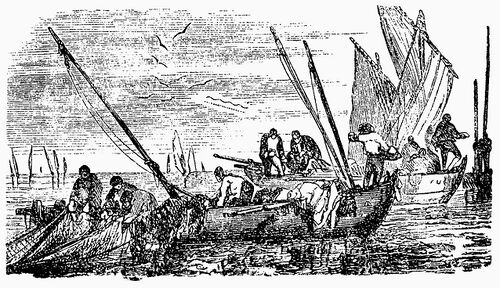
Editor's notes
- ↑ Magic and Prophecy in the East by Kinglake, Alexander William, Spiritual Scientist, v. 1, No. 7, October 22, 1874, p. 74
- ↑ Spiritual Forces in Organic Life by Ellis, J. (signed as Dr. John Ellis)
- ↑ The Katie King Materializations by Child, H. T.
- ↑ A Man's Word for Woman by Harris, Thomas Lake. Signed: Brotherhood of the New Life, Salem-on-Erie, N. Y.; text online.
- ↑ image by unknown author. Several boats fishing.
Sources
-
Spiritual Scientist, v. 1, No. 7, October 22, 1874, p. 74
-
Harris, Thomas Lake, "A man's word for woman" (1871). Harris Broadsides. Brown Digital Repository. Brown University Library.
-
A.W. Kinglake, Traces of travel brought home from the East, 1845 p. 76
-
Page 76, with highlighted fragment, quoted in Magic and Prophecy in the East.
-
A.W. Kinglake, Traces of travel brought home from the East, 1845 p. 82
-
Page 82, with highlighted fragment, quoted in Magic and Prophecy in the East.

